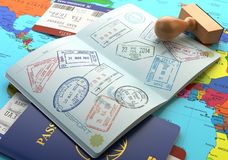The new visa waiver program for Europe’s Schengen Area will be arriving later than expected. The latest announcement from the European Union (EU) has stated that the ETIAS system will now be launched in 2025 instead of 2024. The European Travel Information and Authorisation System (ETIAS) has been in the works for several years. It
Visa Policy for Ireland
Ireland’s visa policy outlines the regulations, requirements, and laws established by the government so that a foreign traveler can visit the country.
Although Ireland is part of the European Union, it does not belong to the Schengen Area and therefore sets its own visa laws and policy.
Ireland, alongside the United Kingdom, the Channel Islands and the Isle of Man, also operates the Common Travel Area which permits British and Irish citizens freedom of movement with minimal or no identity documents.
Ireland’s visa policy is similar to the Schengen Area visa regulation. It permits freedom of movement to all All European Union citizens and nationals of EFTA member states.
It also allows a number of other nationalities around the world to enter Ireland for short stays visa-free for tourism, business, and transit purposes.
At the moment, more than 155 countries have to obtain an embassy visa to enter Ireland, since neither an electronic visa (eVisa) nor a visa on arrival is available for the country. However, a number of visa-required travelers do not need a transit visa if passing through Ireland to an onward destination.
Short-term visa-exempt countries who wish to visit Ireland for longer periods must also obtain a visa from an Irish embassy or consulate to enter the country.
The visa policy for Ireland states that an embassy visa may be issued as a single or multiple entry travel document, for a variety of different purposes and permitted periods of stay.
Although Irish visa requirements for foreign citizens will depend on their nationality, it is usually mandatory to have a valid passport with a minimum validity of 6 months from the date of arrival in Ireland to gain entry to the country.
Find below a comprehensive list of regulations to travel to Ireland from your country of residence.



